初中英语语法一般过去时及练习题讲解学习
初中英语语法—一般过去时详解和习题

一般过去时主要表示过去某时发生的动作或情况。
一:可以从以下几个方面来理解:1)过去某个时间所发生的动作或存在的状态。
e.g. I bought a new shirt yesterday. He was a worker two years ago.2)过去一段时间内,经常性或习惯性的动作。
e.g. When I was a child,I often played with fire. Li Lei always walked to school last term.3)谈到已故人的情况时多用过去时。
e.g. Lu Xun was a great writer.4)有些发生时间不是很清楚的情况,实际是过去发生的,也应用过去时态。
e.g. What did you say?另外,还可用过去时表示委婉的语气。
e.g. Could you lend me your pen?二其结构是"主语+动词的过去式"be动词的过去式为was, were;行为动词的过去式有规则变化和不规则变化两种,规则变化有以下几种情况:1)直接在动词原形末尾加-ed. e.g. work-----worked; ask------asked;2)以e结尾的动词只加-d. e.g. arrive-----arrived; like-----liked.3)末尾只有一个辅音字母的重读闭音节,应先双写这个辅音字母,再加-ed. e.g. shop-----shopped;4)以"辅音字母+y"结尾的动词,先把y变成i,再加-ed. e.g. carry----carried; study------studied.有些动词变过去式是不规则的,e.g. fly------flew; break-----broke; teach-----taught.三其句式变化分为两种情况、1)含有be动词的依然在be上做文章. e.g. I was born in 1980. I was not born in 1980. Were you born in 1980?2)含有行为动词的变否定句要在行为动词前加助动词didn't.,同时把动词变成原形; 变一般疑问句,在句首加助动词did,同时把动词变成原形. e.g. I bought a gift for my mum yesterday. I didn't buy a gift for my mum yesterday. Did you buy a gift for your mum yesterday?四其时间状语为1 yesterday或由其构成的短语,e.g. yesterday morning; 2 由"last+时间"构成的短语, e.g. last year;3由"时间段+ago"构成的短语, e.g. three days ago; 4 还有on the morning of Monday, just now等,以及一些表示过去时态的从句. 注意,在宾语从句中主句为过去,一般从句也为过去.五常见错误如下:《1》把动词变成过去式易出错例: 1 They stoped (stop) talking just now. 2 They plaied (play) football yesterday. 答案: 1 stopped 2 played解析:我们可以记住下面的口诀:"动词变成过去式,双写规律要牢记;y前若是辅音字,y变i加-ed;y前若是元音字,只须直接加-ed."《2》忘记把动词变成过去式例: I fly (fly) kites on the afternoon of Sunday.答案: flew 解析:我们可以记住下面的口诀:"一般过去时态里,过去形式莫忘记".《3》在句式变换时易出错例: 1 We didn't went (not go) out last Friday. 2 Did you had (have) a good time yesterday? 解析:请记住口诀"见助动, 用原形."《4》易与单三人称作主语的一般现在时弄混例: He taughts (teach) me English last year.解析:行为动词的过去式无人称和数的变化.即使主语是单三人称,也和其它人称所用动词的形式一样.《5》易与现在完成时弄混例: 我看过这部电影I saw(see) the film.答案: I have seen (see) the film. 解析:"我看过这部电影"说明我了解这部电影的内容,强调现在的情况,应用现在完成时; 一般过去时态的句子只是说明我看了这场电影,与现在无关..《6》易与过去进行时弄混,这里不在重复。
(完整版)初中一般过去时详细讲解与练习
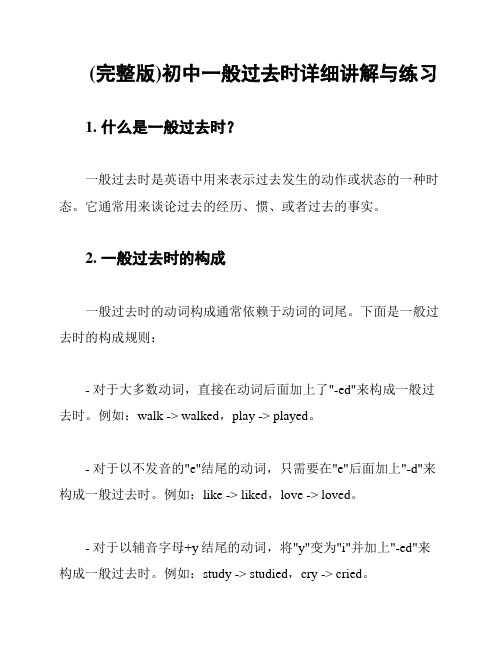
(完整版)初中一般过去时详细讲解与练习1. 什么是一般过去时?一般过去时是英语中用来表示过去发生的动作或状态的一种时态。
它通常用来谈论过去的经历、惯、或者过去的事实。
2. 一般过去时的构成一般过去时的动词构成通常依赖于动词的词尾。
下面是一般过去时的构成规则:- 对于大多数动词,直接在动词后面加上了"-ed"来构成一般过去时。
例如:walk -> walked,play -> played。
- 对于以不发音的"e"结尾的动词,只需要在"e"后面加上"-d"来构成一般过去时。
例如:like -> liked,love -> loved。
- 对于以辅音字母+y结尾的动词,将"y"变为"i"并加上"-ed"来构成一般过去时。
例如:study -> studied,cry -> cried。
- 部分动词的一般过去时需要进行不规则变化。
例如:go -> went,eat -> ate。
3. 一般过去时的用法一般过去时通常用来描述以下情况:- 过去发生的动作:I walked to school yesterday.- 过去的经历:He lived in London for five years.- 过去的事实:She was a teacher in the past.4. 一般过去时的句型练下面是一些练,帮助加深对一般过去时的理解和运用:1. 请用一般过去时填空:Yesterday, I ________ (watch) a movie at home.2. 完成句子:He _____ (visit) his grandparents last summer.3. 改写句子,使用一般过去时:I read a book yesterday. (改为否定句)4. 改写句子,使用一般过去时:They played basketball in the park. (改为疑问句)5. 总结一般过去时是用来表示过去发生的动作或状态的一种时态。
(英语)英语一般过去时常见题型及答题技巧及练习题(含答案)含解析

(英语)英语一般过去时常见题型及答题技巧及练习题(含答案)含解析一、初中英语一般过去时1.Mr Zhang and his wife _______to the party last Sunday。
()A. invitedB. was invitedC. were invited【答案】 C【解析】【分析】句意:上周星期天请的张先生和妻子参加晚会。
表示上周星期天发生的过去动作,用一般过去时态;主语Mr Zhang and his wife是谓语动词invite的承受者,用被动语态,主语Mr Zhang and his wife表示复数合义。
故选C。
2.The traffic was heavy this morning, but Dad________ to get to the office on time.A. managesB. managedC. would manageD. will manage【答案】 B【解析】【分析】句意:今天早上交通非常繁忙,但爸爸设法按时赶到了办公室。
根据The traffic was heavy this morning.可知,本句时态为一般过去时,动词“设法”manage的过去式为managed。
故选B。
【点评】考查一般过去时,注意判断句子的时态,选择正确答案。
3.I was walking in the street when someone _______ me.A. calledB. was callingC. callsD. call【答案】 A【解析】【分析】句意:我正在街上走这时有人叫我。
状语从句中前后时态要保持一致,根据主句中的was walking可知此处用过去的时态,排除CD;此处call表示短暂性动作,所以不用进行时态,故答案为A。
【点评】考查动词的时态,注意时态的前后一致。
4.-Have you ever been to Xiamen?-Yes. I _ there in 2013.A. goB. wentC. have gone【答案】 B【解析】【分析】句意:一你去过厦门吗?一是的,我2013年去的。
初中英语语法一般过去时专项讲解及练习

初中英语语法一般过去时专项讲解及练习一般过去时是英语中常用的时态之一,用来表示发生在过去某个具体时间的动作或状态。
以下是一般过去时的用法及一些练题。
一般过去时的用法1. 表示过去某个具体时间发生的动作或状态。
- I played football yesterday.(我昨天踢了足球。
)- She was a teacher two years ago.(两年前她是一名老师。
)2. 表示过去经常性、惯性的动作或状态。
- We always went swimming in the summer.(我们夏天经常去游泳。
)- He used to live in the countryside.(他过去住在乡下。
)3. 表示过去的客观事实或真理。
- The sun rose in the east.(太阳从东方升起。
)- She knew the answer.(她知道答案。
)一般过去时练题请根据句子的意思,在括号中填上适当的动词的过去式。
1. My friend __________ (visit) me last week.(我朋友上个星期来看我。
)2. They __________ (watch) a movie yesterday evening.(他们昨晚看了一部电影。
)3. Helen and I __________ (play) tennis together when we were children.(海伦和我小时候一起打网球。
)4. He __________ (not go) to school yesterday because he was sick.(他昨天因为生病没去上学。
)5. We __________ (live) in that house for five years before we moved.(我们在那个房子住了五年才搬走。
)总结一般过去时用于表示过去某个具体时间发生的动作或状态,过去的经常性、习惯性动作或状态,以及客观事实或真理。
(完整版)中学一般过去时详细讲解与练习

(完整版)中学一般过去时详细讲解与练习一般过去时的使用一般过去时是英语中表示过去发生的动作、状态或惯的一种时态。
在一般过去时中,动词的过去式形式通常用来表示过去的时间。
以下是一般过去时的使用情况:1. 表示过去发生的动作一般过去时可以用来表示过去已经完成的动作。
例如:- He played soccer yesterday.(他昨天踢足球。
)- She went to the beach last weekend.(她上周末去了海滩。
)2. 表示过去的状态或特征一般过去时也可以用来描述过去的状态或特征。
例如:- They were happy when they received the news.(当他们收到那个消息时他们很开心。
)- The house was big and beautiful.(那个房子又大又漂亮。
)3. 表示过去的惯一般过去时还可以用来表示过去经常性的动作或惯。
例如:- I always ate breakfast before going to school.(我过去上学前总是吃早餐。
)- She often went for a run in the evening.(她过去经常在晚上去跑步。
)一般过去时的构成与规则动词变化- 对于大多数动词,一般过去时的构成是在动词原形后面加上-ed。
例如:play → played, work → worked。
- 对于以e结尾的动词,只需要加-d。
例如:live → lived。
- 对于以辅音字母+y结尾的动词,将y变为i然后加-ed。
例如:study → studied。
- 对于以辅音字母结尾的重读闭音节动词,重读闭音节的辅音字母要双写,再加-ed。
例如:stop → stopped。
- 一些动词的过去式形式是不规则的,需要特殊记忆。
例如:go → went, eat → ate。
一般过去时的练以下是一些练,帮助你巩固一般过去时的使用和动词形式变化:1. Fill in the blanks with the correct past tense form of the verbs:- She __________ (watch) a movie last night.- They __________ (visit) their grandparents on the weekend.- He __________ (study) math for two hours yesterday.2. Rewrite the sentences in the past tense:- I go to school every day. (改为过去时)- Jane plays tennis on Saturdays. (改为过去时)- We eat pizza for lunch. (改为过去时)- She __________ (go/went) to the party last night.- We __________ (see/saw) a movie at the cinema.- He __________ (run/ran) in the race and won.请根据上述讲解和练习进行学习和练习,巩固中学一般过去时的用法和动词形式变化。
初中英语一般过去时详解及练习题

一般过去时1.一般过去时表示在过去某一时间发生的动作或存在的状态表示时间的词有:yesterday,this morning/afternoon/evening,last+时间(上个...)last night,last Sunday,last week,last year2.一般过去时的基本结构肯定句式①主语+was/were+其他例句:He was here yesterday.②主语+动词过去式+其他例句:I went to play basketball last Sunday.否定句式①主语+was/were+not+其他例句:She wasn’t at home this morning.②主语+didn’t+动词原形+其他例句:I didn’t find you yesterday..一般疑问句①Was/Were+主语+其他例句:Were you at school last week?②Did+主语+动词原形+其他例句:Did you play football yesterday?特殊疑问句特殊疑问词(如what,why,when,where等)+一般疑问句句式例句:Where were you yesterday?What did you do yesterday?3.动词的过去式规则动词①一般情况下直接在动词后+ed例:work-worked look-looked walk-walked②以e结尾的单词直接+d例:live-lived hope-hoped use-used③以辅音字母+y结尾的,改y为i再+ed例:study-studied carry-carried以元音字母+y,直接+ed例:enjoy-enjoyed play-played⑤以重读、一个辅音字母结尾的闭音节结尾的动词,双写最后的辅音字母+ed例:stop-stopped plan-planned prefer-preferred不规则动词(书本76页表格)动词原形过去式动词原形过去式is/am was do didare were get gotbegin began go wentbuy bought have hadcome came make maderead read see sawrun ran take tookeat ate一般过去时练习题一、写出下列动词的过去式1.is/am_____2.fly_____3.plant_____4.are_____5.drink_____6.play_____7.go_____8.make_____9.do_____10.dance_____11.worry_____12.ask_____13.eat_____14.pass_____二、用所给动词的适当形式填空1.He_____(be)at home last night.2.He_____(visit)the Great Wall last year.3.We_____(have)a good time yesterday.4.We_____(go)to school by bus last year.5.Sam_____(did)the housework yesterday.6._____(do)you______(play)the violin this morning?三、选择题1.The two girls____all in Class1last year.A.areB.wasC.were.D is2.This morning he____a taxi.A.tookB.takesC.take.D is taking3.I_____to school at8o’clock yesterday.A.goB.am goingC.went D goes4.-What did you do last night?-I______a story bookA.readB.readedC.am reading D reads。
初中英语一般过去时讲解+练习(含答案)
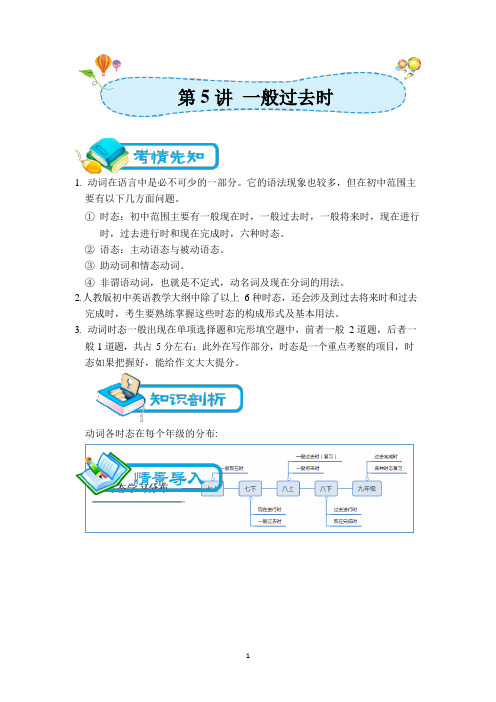
1. 动词在语言中是必不可少的一部分。
它的语法现象也较多,但在初中范围主要有以下几方面问题。
① 时态:初中范围主要有一般现在时,一般过去时,一般将来时,现在进行时,过去进行时和现在完成时,六种时态。
② 语态:主动语态与被动语态。
③ 助动词和情态动词。
④ 非谓语动词,也就是不定式,动名词及现在分词的用法。
2. 人教版初中英语教学大纲中除了以上 6 种时态,还会涉及到过去将来时和过去完成时,考生要熟练掌握这些时态的构成形式及基本用法。
3. 动词时态一般出现在单项选择题和完形填空题中,前者一般 2 道题,后者一般 1 道题,共占 5 分左右;此外在写作部分,时态是一个重点考察的项目,时态如果把握好,能给作文大大提分。
动词各时态在每个年级的分布:第 5 讲 一般过去时1.yesterday 或与其构成的短语:yesterday morning(afternoon, evening)等;2.由 last+时间名词构成的短语:last night, last year (winter, month, week)等;3.由―时间段+ago 构成的短语:a moment ago, a short time ago, an hour ago 等;4.其它 just now ,过去的时间:in 2000 等;一般过去时在七年级下册 Unit 11 中第一次出现,在这个单元的学习中,学生需要掌握以下知识点:一般过去时的定义及特征一般过去时的两种结构及其变化一般过去时的规则动词变形和不规则变形一般过去时的定义及特征定义:表示过去某个时间里发生的非持续性动作或存在的状态,也表示过去经常或反复发生的动作。
She opened the door this morning. (过去的非持续性动作) They were expensive twenty years ago. (过去存在的状态) I went swimming every Saturday last year. (过去经常发生的事)特征: a.谓语动词用过去式She was a doctor.I watered the flowers in the back yard. b.有表示过去的时间词She saw some paintings yesterday . Mary went fishing last weekend .注意:常与过去时搭配使用的标志性时间词1. 否定: 主语+was/were + not +其它 I was not (wasn’t) here yesterday.My parents were not (weren’t) at home last 2. 一般疑问句: Was/ Were +主语+其他?肯定回答用―Yes, 主语+was/were. 否定回答用―No, 主语+wasn’t/weren’t. ―Were you at home yesterday? ―Yes, I was. (No, I wasn’t.)—Were Wei Hua and Han Mei here just3. 特殊疑问句:特殊疑问词 + was/ were + 主语+其他?【即学即练】1. He usually gets up early in the morning. But he late today.2. She usually works from 8 a.m. to 5 p.m. But she from 8 a.m. to 6 p.m. yesterday.3. They often go to the park on Sundays. But they to the park last Monday.4. He reads the newspaper at breakfast. But he the newspaper yesterday morning.一般过去时的两种结构及其变化结构一:表示过去的状态: 主语+was/were +其它如:She was here yesterday.Three years ago I was a pupil. My parents were at home last night. 变化形式:否定:主语+did not +实义动词原形+其它 He didn’t watch TV yesterdayMike did not go to the farm last Sunday.一般疑问句: Did+ 主语+实义动词原形+其它? Did he watch TV yesterday?Did Mike go to the farm last Sunday?3.特殊疑问句:特殊疑问词 + did+ 主语 +实义动词原形+其它?What did he do yesterday?Where did Mike go last Sunday?结构二:表示过去发生的动作: 主语+实义动词过去式+其它注意:实义动词过去式分为规则和不规则变化(知识点三、四将会做详细讲解)如:He watched TV yesterday.Mike went to the farm last Sunday. Tom came to China last month. 变化形式:【即学即练】 1. My father ill yesterday. ( 2017 长沙七年级期末) A. isn’t B. aren’t C. wasn’tD. weren’t 2. your parents at home last week? ( 2017 江西七年级月考)A. isB. wasC. areD. were3. The twins in Dalian last year. They here now. ( 2016 大连七年级期末) A. are; wereB. were; areC. was; areD. were; was4. I my homework at 7:00 yesterday evening. ( 2017 兰州七年级期末)A. finishedB. would finishC. was finishingD. finish5. —?— He did some reading at home. ( 2017 安徽中考) A. What does your father do yesterday evening? B. What does your brother do in the school? C. What did your brother do over the weekend? D. Where did your brother go last Sunday?一般过去时的规则动词规则变形及不规则变形规则变形:情况加法原形例词一般情况加-ed look looked 以e 收尾的词加-d use used末尾只有一个辅音字母的重读闭音节词先双写这个辅音字母,再加-edstopplanstoppedplanned以“辅音字母+y”结尾的动词先变y 为i,再加-ed worrystudyworriedstudied不规则变形:1.中间去e 末尾加t,如:keep →kept,feel →felt,sleep →slept,sweep →swept2.结尾d 变t,如:build →built,lend →lent,send →sent,spend →spent3.遇见i 改为a,如:ring →rang,sit →sat,drink →drank,sing →sang,swim→ swam,4.“骑(马)”“开(车)”“写(字)”把i 变o 如:ride →rode,drive →drove,write →wrote 5.“想”“买”“带来”“打仗”ought 换上,如:think →thought,buy →bought,bring →brought,fight →fought6.“教书”“抓住”——aught 切莫忘,如:teach →taught,carry →caught7.ow/aw 改为ew 是新时尚,如:know →knew,grow →grew,throw →threw,draw →drew 8.“放”“让”“读”过去式与原形一个样,如:put → put,let → let,read → read /red/【即学即练】Dear Jim,My school trip 1. (is) great! We 2. (have) so much fun! We 3.(go) to Green Park. We 4. (climb) the mountains there and 5.(see) a lot of flowers. We 6. (eat) lunch under some trees and 7.(play) some games after that. But at about two o’clock, it 8. (get) very cloudy and we 9. _ (worry) it would rain. Luckily, it 10. (do not),and the sun 11. (come) out again!Bill易错点一:难以判别是否用过去式,如:I went to the supermarket and bought (buy) some fruit.由于没有找到时间状语,因而不知道应该填什么。
初中英语语法——一般过去时讲解与练习

The pronunciation of the Past of Regular Verbs
• /t/ when the infinitive ends in a VOICELESS Consonant ( /p/,
/k/,/ks/, /s/ , /f/, /h/, /Í/, /S/ ).
e.g. liked /laikt/ watched /wQÍt/ stopped /stQpt/
EXERCISE: Complete the text with the PAST
form of the verbs in brackets.
• Shakira is perhaps the most recognizable voice in Latin pop/rock today. When she ------(BE) only 8, she-----(DEDICATE) her first song called "Tus gafas oscuras", to her father. Two years later, she------(WIN) local and national talent contests. By 13, she had signed a record deal with Sony in Colombia, which-----(RESULT) in her first album, "Magia (Magic)", a compilation of songs she-----(WRITE) between 8 and 13 years old. She was chosen to represent her country at the Festival OTI in Spain. But she was under the minimum age of 16 and she ------(CAN NOT) participate. So instead, Shakira ------(RECORD) a second album of original material, "Peligro (Danger)". At that point, Shakira-----(TAKE) a break from music, -----(GRADUATE) from high school (at age 15-really) and back with a vengeance. The result was the phenomenally successful "Pies Descalzos" which-----(SELL) more than four million copies worldwide. In addition, this determined girl ------(WANT) to try her luck as an actress in "Oasis", a soap opera, but she --------(THINK) music was her life instead of TV. Then she---- (BEGIN) to be very popular: the Colombian government-------- (DESIGNATE) Shakira as an official goodwill ambassador.
(完整版)一般过去时讲解及练习
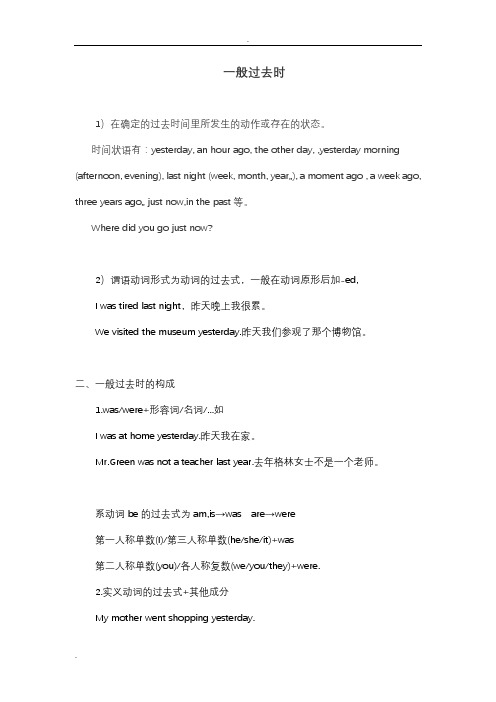
一般过去时1)在确定的过去时间里所发生的动作或存在的状态。
时间状语有:yesterday, an hour ago, the other day, ,yesterday morning (afternoon, evening), last night (week, month, year…), a moment ago , a week ago, three years ago… just now,in the past等。
Where did you go just now?2)谓语动词形式为动词的过去式,一般在动词原形后加-ed,I was tired last night,昨天晚上我很累。
We visited the museum yesterday.昨天我们参观了那个博物馆。
二、一般过去时的构成1.was/were+形容词/名词/...如I was at home yesterday.昨天我在家。
Mr.Green was not a teacher last year.去年格林女士不是一个老师。
系动词be的过去式为am,is→was are→were第一人称单数(I)/第三人称单数(he/she/it)+was第二人称单数(you)/各人称复数(we/you/they)+were.2.实义动词的过去式+其他成分My mother went shopping yesterday.我妈妈昨天去购物了。
His uncle worked in Beijing in 2014.他叔叔2014年在北京工作。
三、一般过去时的句式四、动词过去式的变化规则3 used toused to + do:"过去常常"表示过去习惯性的动作或状态,但如今已不存在。
Mother used to take a walk. (过去常常散步)二、构成及变化1. Be动词在一般过去时中的变化:am 和is在一般过去时中变为was。
一般过去时的讲解及练习
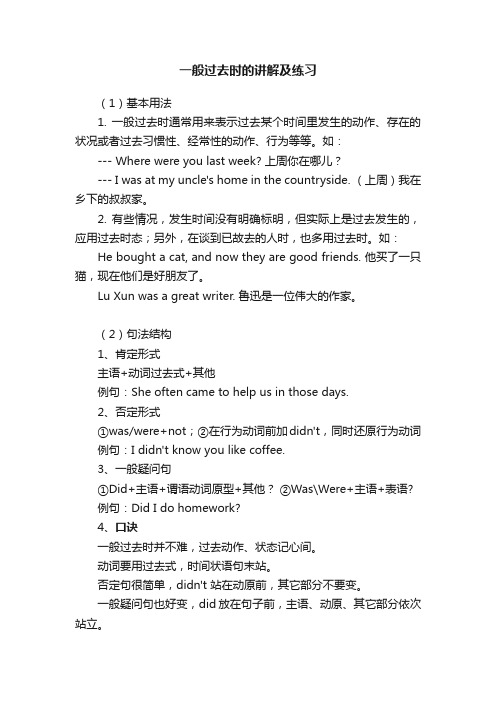
一般过去时的讲解及练习(1)基本用法1. 一般过去时通常用来表示过去某个时间里发生的动作、存在的状况或者过去习惯性、经常性的动作、行为等等。
如:--- Where were you last week? 上周你在哪儿?--- I was at my uncle's home in the countryside. (上周)我在乡下的叔叔家。
2. 有些情况,发生时间没有明确标明,但实际上是过去发生的,应用过去时态;另外,在谈到已故去的人时,也多用过去时。
如:He bought a cat, and now they are good friends. 他买了一只猫,现在他们是好朋友了。
Lu Xun was a great writer. 鲁迅是一位伟大的作家。
(2)句法结构1、肯定形式主语+动词过去式+其他例句:She often came to help us in those days.2、否定形式①was/were+not;②在行为动词前加didn't,同时还原行为动词例句:I didn't know you like coffee.3、一般疑问句①Did+主语+谓语动词原型+其他?②Was\Were+主语+表语?例句:Did I do homework?4、口诀一般过去时并不难,过去动作、状态记心间。
动词要用过去式,时间状语句末站。
否定句很简单,didn't 站在动原前,其它部分不要变。
一般疑问句也好变,did放在句子前,主语、动原、其它部分依次站立。
特殊疑问句也简单,疑问词加一般疑问句记心间。
最后一条请注意,动词过去式要牢记!(3)时间状语与一般过去时连用的时间状语有:yesterday(昨天), last night (昨晚), last week(上个星期), four days ago(四天前), in 2002(在2002年), just now(刚才), the day before yesterday(前天)等。
初中英语八大时态的详细讲解与练习

初中英语语法 :八种时态详解与练习一.观点:英语中表示不一样时间发生的动作或存在的状态,需用不一样的动词形式表示,这种不一样的动词形式称为时态。
二.种类:(基本时态)一般此刻时一般过去时一般未来时过去未来时此刻进行时此刻达成时过去进行时过去达成时一般此刻时一、观点:常常、频频发生的动作或行为及此刻的某种状况。
二、常搭配的时间状语:always, usually, often, sometimes, every week(day, year, month,), once a week, on Sundays, etc.三、基本构造①be 动词( is,am,are);②行为动词 (主语是第三人称单数时谓语动词要加s 或 es 外 )否认形式:① am/is/are+not;②此时态的谓语动词若为行为动词,则在其前加don't,如主语为第三人称单数,则用doesn't,同时复原行为动词。
一般疑问句:①把 be 动词放于句首;②用助动词 do 发问,如主语为第三人称单数,则用does,同时,复原行为动词。
例句:I go to school at 6 every morning. 每日清晨我七点去上学。
Summer follows spring. 春季以后是夏季。
I learned that the earth goes around the sun when I was in primary school我.在小学就学过地球是环绕太阳转的。
Pride goes before a fall. 骄者必败。
四、基本用法:1)描绘目前时间内常常出现、频频发生的动作或存在的状态。
在这种情形中,句子常带有表示频次的时间状语: always , everyday , often , once a week (month , year , etc.) , sometimes , seldom , usually等等,以表示句中的动作或状态是习惯性的、常常性的。
一般过去时的讲解和练习

一般过去时的讲解和练习一、一般过去时:表示过去某个时间发生的动作或存在的状态。
常和表示过去的时间状语连用。
如:ago以前,then那时,yesterday昨天,last night昨晚,last week上周,last year去年等。
二、一般过去时句子结构:主语+动词过去式+其它。
三、动词过去式的变化规则:1.一般在动词词尾加ed,如:walk--walked2.动词词尾以e结尾的,加d。
如:like--liked3.以“辅音字母+y”结尾的,把y改为i,再加ed。
如:study--studied4.末尾只有一个元音字母和一个辅音字母的重读闭音节,先双写末尾的辅音字母,再加ed。
如:stop--stopped四、动词过去式的不规则变化:go--went do---did am/is--was are---were put-put have-had ......练习一、写出下列动词的过去式。
1.am/is2.are3.go4.do5.play6.talk7.phone8.take9.have 10.eat 11.cook 12.walk 13.listen 14.help 15.stop 16.watch二、用括号里正确的形式填空。
1.I (go)to the park yesterday.2.She (do)her homework last night.3.Tom (play)football last Monday.4.He (study)very hard many years ago.5.I (be)at home yesterday.6.My grandma (cook)noodles last weekend.7.Amy and I (watch)TV yesterday.三、单项选择。
()1. your mother at home yesterday?A.IsB.WasC.Were()2.Did she the piano then?A.playedB.playsC.play()3.Tony do his homework last night.A.didn’tB.don’tC.doesn’t ()4.My father at home last Sunday.A.wasn’tB.isC.were ()5.Did you noodles yesterday?A.cookedB.cookC.cooks。
(完整版)中考时态专题一般过去时详细讲解及练习
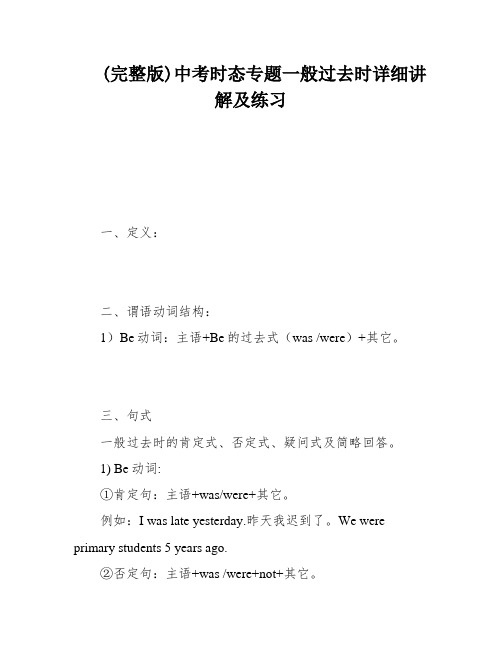
(完整版)中考时态专题一般过去时详细讲解及练习一、定义:二、谓语动词结构:1)Be动词:主语+Be的过去式(was /were)+其它。
三、句式一般过去时的肯定式、否定式、疑问式及简略回答。
1) Be动词:①肯定句:主语+was/were+其它。
例如:I was late yesterday.昨天我迟到了。
We were primary students 5 years ago.②否定句:主语+was /were+not+其它。
例如:___(我们昨天没迟到)③一般疑问句:be动词提前。
Was/Were+主语+其它?例如:I was ___(改一般疑问句) →Were you ill yesterday?(你昨天病了吗?)肯定回答:Yes, I was. (是的,我病了。
)否定回答:No, I wasn't. (不,我没病。
)④特殊疑问句:对谓语动词进行提问的:疑问词+was/were+主语+其它(一般疑问句)?2) 实义动词:①肯定句:主语+V-ed+其它。
例如:I called up my good friend just now.②否定句:主语+didn’t+V原形+其它。
例如:I didn’t argue with Tom last week.③一般疑问句:Did+主语+V原形+其它?例如:___ 2010. (改一般疑问句) →Did you buy a souvenir in 2010?肯定回答:Yes, I did.否定回答:No, I didn’t.④特殊疑问句:疑问词+did+主语+V原形+其它?例如:When did you buy the book?(你是什么时候买的这本书?)Finally, let's fill in the blanks with the correct form of the verb. "Was" should be used for the first blank, "played" for the second, "went" for the third, and "read" for the fourth.5. Tom was upset because he had failed the English test again.6. We moved to Beijing 8 years ago.1. C2. C3. B4. A5. C6. A7. B8. ATom was ___ down because he had failed his English test once again. It had e a recurring problem for him. Eight years ago,my family and I relocated to Beijing. This morning, I asked my friend what time she had arrived at school.1. What did they have for breakfast last week?2. ___?3. Jim ___ she was ___.4. They were not late the day before yesterday.5. Where did you go?6. Did Wei Fang have a good time last summer n? Yes, she did. / No, she didn't.7. Li Hong did not do her ___.8. How did Mr Gao go to work last year?9. Is there tea in the cup?1. Did Wei Fang have a good time last summer n? Yes, she did. / No, she didn't.2. Li Hong did not do her ___.3. How did Mr Gao go to work last year?4. Is there tea in the cup?。
中考英语专题讲练: 一般过去时(含解析)

一般过去时一、一般过去时表示过去某个时间里发生的动作或状态;过去习惯性、经常性的动作、行为;过去主语所具备的能力和性格。
二、句子结构主语+did (动词过去式)主语+was/were三、基本用法用法示例表示过去发生的动作或状态My family had a picnic in the park last weekend.我们全家人上周末在公园有个野炊。
表示过去经常或反复发生的动作或状态When she was young, she usually went to the library toread books.当她小的时候,她经常去图书馆读书。
表示过去的情况或状态There was a small pound in the school before.之前学校这里有个小池塘。
知识精讲四、时间状语:1. yesterday, the day before yesterday2. 时间段+ago: three years ago, long ago…3. last: last day/ week/ year…4. in +过去年份: in 2015…5. just now 刚才五、一般过去时动词过去式的规则变化情况变形示例一般情况加-edwork-worked,listen-listened 以e字母结尾直接加-dlive-lived,receive-received“辅元辅”结构双写词尾辅音字母加-ed stop-stopped, chat-chatted以辅音字母加 y结尾变y为i 再加-ed study-studied 以元音字母加 y结尾直接加-ed enjoy-enjoyed六、一般过去时动词过去式的不规则变化变化类型示例A---A---A型cost cost cost 花费 hit hit hit 打(现在式、过去式和过去分词同形)cut cut cut 割,切read read read 读let let let 让put put put 放下A---A---B型beat beat beaten 打A---B---A型come came come 来、become became become 变、runran run 跑A ---B ---B型burn burnt burnt 燃烧learn learned/learntlearned/learnt学习build built built 建筑lose lost lost 失去lend lent lent 借给spend spent spent 花费pay paid paid 付lay laid laid 下蛋say said said 说bring broughtbrought 带来buy bought bought 买think thoughtthought 想sleep slept slept 睡keep kept kept 保持sweep swept swept 扫feel felt felt 觉得find found found 发现have had had 有get got got 得到hold held held 盛,握leave left left 离开make made made 制造meet met met 遇见sell sold sold 卖tell told told 告诉teach taught taught 教stand stood stood 站understand understood understood 明白catch caught caught 抓住sit sat sat 坐fly flew flown 飞A---B---C型eat ate eaten 吃fall fell fallen 落下give gave given 给take took taken 拿see saw seen 看见write wrote written写ride rode ridden 骑drive drove driven驾驶throw threw thrown抛,扔blow blew blown 吹grow grew grown 生长steal stole stolen 偷drink drank drunk 饮choose chose chosen 选择forget forgot forgotten 忘记begin began begun 开始ring rang rung 按铃sing sang sung 唱swim swam swum 游泳draw drew drawn 拉,绘画show showed shown 展示speak spoke spoken 说话break broke broken 破碎,折断know knew known 知道其他不规则动词的变化be(am, is) was/ werebeen 是go went gone 去lie lay lain 躺do did done 做wear wore worn 穿七、相关句式be动词行为动词用法主语是单数用was,复数则用were。
(完整版)初中一般过去时讲解及训练

(完整版)初中⼀般过去时讲解及训练⼀般过去时讲解及练习⼀、⼀般过去时的概念和⽤法⼀般过去时表⽰过去某个时间发⽣的动作或存在的状态,常和表⽰过去的时间状语连⽤。
⼀般过去时也表⽰过去经常或反复发⽣的动作。
Eg:-What did you do yesterday?-I met Lin Tao . (过去某个时间发⽣的动作)I was there a moment ago. (过去某个时间存在的状态)We often played together when we were children.(过去经常或反复发⽣的动作)注:表⽰过去经常发⽣的动作还可⽤used to 。
Eg:He used to smoke a lot, but he doesn’t now. 他过去经常抽烟,但现在不抽了。
⼆、常⽤于⼀般过去时的时间状语yesterday, this morning,just, just now, ...ago(a moment ago,3 days ago,2 hours ago...), in the past,last night / year / week, once upon a time, the other day,以及时间状语从句中(常⽤引导词:before,after,when,until,as soon as 等)。
Eg:It was raining heavily when I left school.Mr Green didn’t start cooking until his son was back from school last night.三、⼀般过去时对谓语动词的要求⼀般过去时⽤动词的过去式构成。
即⼀般过去时的谓语动词要⽤动词的过去式。
动词过去式的构成分规则变化和不规则变化两种形式,不规则变化通常需要逐个记忆,规则变化则遵循以下原则:(1)⼀般在动词后加-ed。
如:play—played, offer—offered, weigh—weighed, destroy— destroyed, sign—signed.(2)在以字母e结尾的动词后,只加-d。
英语人教版初中一年级下册 一般过去时详细讲解及练习(精品附练习答案)
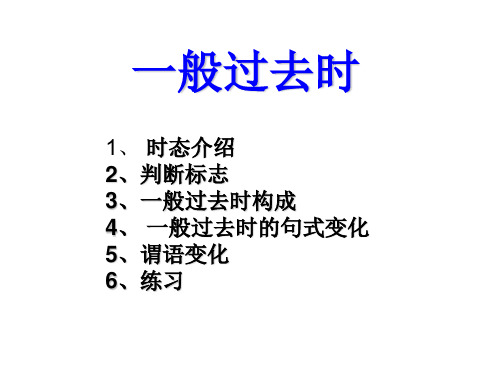
• She _d_id__n_’_t___ _w__a_s_h___ the clothes last Sunday
• 5. She is going to go shopping tomorrow. (变否定 句)
stopped planned tripped
4. 结尾是“辅音字母+y”的动词, study studied
先变“y”为“i”再加-ed
carry carried
规则动词-ed的读音
• 说明: • 1、清念 /t/ ,即 ed 在清辅音
后面念 /t/ , • 例:finished helped
passed cooked
answer answered read
used lived woke kept said cleaned bought played learnt/ed saw read
run ran borrow borrowed grow grew watch watched write wrote smile smiled open opened begin began swim swam carry carried study studied
stop stopped finish finished
巧记动词过去时态
动词一般过去时,表示过去发生事; be用was或用were, have,has变had; 谓语动词过去式,过去时间坐标志; 一般动词加-ed,若是特殊得硬记。 否定句很简单,主语之后didn’t添; 疑问句也不难,did放在主语前; 如果谓语之前有did,谓语动词需还原; 动词若是was,were,否定就把not添。
- 1、下载文档前请自行甄别文档内容的完整性,平台不提供额外的编辑、内容补充、找答案等附加服务。
- 2、"仅部分预览"的文档,不可在线预览部分如存在完整性等问题,可反馈申请退款(可完整预览的文档不适用该条件!)。
- 3、如文档侵犯您的权益,请联系客服反馈,我们会尽快为您处理(人工客服工作时间:9:00-18:30)。
一般过去时的用法一般过去时表示过去某个时间发生的动作或存在的状态。
常和表示过去的时间状语连用。
如:last year, yesterday等;也可表示过去经常反复发生的动作,常和often, always等频率副词连用。
例如:I saw him in the street yesterday. 昨天我在街上看见他了。
Li Mei always went to school on foot last year. 去年李梅总是步行上学。
注意:也可以用“used to +动词原形”表示过去经常或反复的动作。
eg. We used to get up early. 我以前总是早起。
(意指现在不早起了)1.一般过去时的形式:动词be: 第一人称单数和第三人称单数用was, 其余的人称一律用were。
动词have: 一律用had, 没有人称和数的变化。
行为动词:一律用过去式,没有人称和数的变化,行为动词的过去式有两类,一类是规则动词,另一类是不规则动词。
一般过去时动词的肯定、否定、一般疑问句和简略回答以及特殊疑问句的形式见列表:肯定、否定形式行为动词的过去时的否定式,要使用助动词 do 的过去式did,后面的谓语动词要还原为原形。
注意:在非正式语如口语中,was not, were not, had not和did not 可以分别缩写成wasn’t, weren’t, hadn’t和didn’t。
一般疑问句和简略回答特殊疑问句和简略回答2.一般过去时的几种句型(这里只讲行为动词)肯定句结构为:主语+动词的过去式+其他。
如:He went to the toy store yesterday. 他昨天去玩具店了。
否定句结构为:主语+did not (didn’t)+动词原形+其他。
如:He didn’t go to the toy store yesterday. 他昨天没去玩具店。
一般疑问句的构成:Did+主语+动词原形+其他?如:1) -Did you go to Beijing last week?-Yes, we did. (No, we didn't.)2) -Did you meet the businessman before?-No, I didn't. (Yes, I did.)特殊疑问句的构成:疑问词+did+主语+动词原形+其他?如:1) -What did you do last night?-I did my homework.2) -Where did you go last week?-I went to Shanghai with my parents.一般过去时口诀一般过去时并不难,表示过去动作、状态记心间。
动词要用过去式,时间状语句末站。
否定句很简单,didn’t 站在动词原形前,其他部分不要变。
一般疑问句也好变,did放在句子前,主语、动词原形、其他部分依次站。
特殊疑问句也简单,疑问词加一般疑问句记心间。
最后一条请注意,动词过去式要牢记。
小朋友们口诀记,学会一般过去时没问题。
Ⅱ. 行为动词的一般过去式变化规则行为动词的过去式有规则变化和不规则变化两种。
规则动词过去式的构成有四条规则:①一般在动词原形末尾直接加上-ed。
如:look-looked。
②以不发音的字母e结尾的动词,去e再加-ed。
如:live-lived。
③末尾只有一个辅音字母的重读闭音节,先双写这个辅音字母,再加-ed。
如:stop-stopped。
④末尾是辅音字母+y结尾的动词,先变y为i,然后再加-ed。
如:study-studied。
(2)不规则动词的过去式需特殊记忆。
如:am(is)-was, are-were, go-went, come-came, take-took, have (has)-had等。
一般过去时练习一般过去时一、选择( ) 1. What _____they _____dinner yesterday ?A. do; have forB. did; had forC. did; have forD. were; have for( ) 2. Could you tell me what time the plane ?A. leftB. leavesC. leavedD. was leaving( ) 3. One of us ______band last month.A. leavesB. leaveC. leavedD. left( ) 4. Where _______your mother born?A. areB. wasC. wereD. is( ) 5. Do you know why he_____for class last year?A. was always lateB. always was lateC. is late alwaysD. is always late ( ) 6. I got up _____this morning, so I _____breakfast and went to school.A. late; didn’t haveB. early; didn’t haveC. late; hadn’tD. early; hadn’t( ) 7. It ______much cold today than it _____ yesterday.A. is; isB. was; wasC. is; wasD. was; is( ) 8. He didn’t come_____goodbye to us and away.A. say; goB. say; wentC. to say; wentD. to say ; go( ) 9. Her pen was broken. She____ to _____a new one.A. wants; buysB. wanted; boughtC. wants; boughtD. wanted; buy( ) 10. I thought the dress_____ really pretty.A. isB. wasC. /D. were( ) 11. I tired now, but it___ an exciting day.A. am; wasB. was; wasC. was; isD. am; is( ) 12. He said he ______go to cook dinner for us.A. willB. wouldC. /D. doesn’t( )13. I stayed in the sitting room and ____my friends all the time.A. talk toB. talkedC. talk aboutD. talked to( )14. She also ____her ____in a 1990s style.A. weared; hairB. wore; hairC. wear; hairD. wears; hairs( )15. I went to see you lastSaturday, there nobody in the room.A. but; wasB. and; wereC. and; wasD. but; is二、用所给词的适当形式填空1.He put the books away and ________ (go) home.2. The boy is running and________ (tie) his shoes on the playground.3. My father________ (buy) a new computer for________ (I ) yesterday.4. He often ______ (go) to school by bike, but last year he often _________ (walk) to school.5. After she finished _______ (pack) everything, she ________(go) to bed.6. ---- Who______(wash) the plates on the table ?---- Jenny did.7. ---- When _______ you_____ (see ) the film “ Titanic”?8. It’s half past eleven now. Jim_____(have) lunch. He usually______(have) it at this time.9. She ______(write) to Jill last month. She _________(write) to him next time.10. The students ________ (stop) talking when their teacher came up.三、单句改错:下面每句均有一处错误,指出并加以改正1. Did you found the answer to thisquestion?2. Mary and her brother was born on the sameday.3. We start this lesson about ten minutesago.4. She hadn’t anything for breakfast thismorning.5. They came here for ayear.6. Amy singed a song for us at thatparty.7. He said he will help me with my English when he wasfree.8. The man saw the bag until it waslate.一、. 句型转换1. The children had a good time in the park.否定句:__________________________________________一般疑问句:________________________________________对划线部分提问:____________________________________2. There were about nine hundred people at the concert.(音乐会)否定句:__________________________________________一般疑问句:________________________________________对划线部分提问:____________________________________3. There was only one problem.否定句:__________________________________________一般疑问句:________________________________________肯定/否定回答:____________________________________4. Ann did her homework yesterday evening.否定句:__________________________________________一般疑问句:________________________________________对划线部分提问:____________________________________5. Last week I read an English book.否定句:__________________________________________一般疑问句:________________________________________肯定/否定回答:____________________________________对划线部分提问:____________________________________ 二、写出下列动词的三单现、过去式和现在分词go ______ _______ _______ enjoy _______ _______ ________buy ______ ______ _______ eat______ _______ _______get _______ _______ _______ walk ________ _______ ________ take______ ______ ______ dance_______ ________ _______write _______ ______ ______ run______ _______ _______swim_______ _______ _______ find _______ _______ _______ begin______ ______ ______ eat ______ _______ ______play ______ ______ _______ study ______ ______ ________三. 用所给词的适当形式填空。
